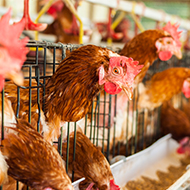London Zoo conducts Annual Stocktake
London Zoo's data will support conservation breeding programmes around the world.
Zookeepers at London Zoo have begun the process of counting every animal in the zoo’s care, as part of its Annual Stocktake.
The Annual Stocktake, a requirement of London Zoo’s zoological licence, will be shared with zoos around the world to support the conservation breeding programmes of endangered animals.
London Zoo houses over 10,000 individual animals, which all need to be accounted for in its report.
This year’s count includes a colony of 65 Humboldt penguins, which includes 11 penguin births and five recently accepted arrivals. The new arrivals have been introduced as part of a European breeding programme, and will form breeding pairs in spring.
Also included in the count were seven critically endangered Western lowland gorillas. In early 2024, the troop welcomed the birth of two baby gorillas – Juno and Venus – marking a major conservation success for global numbers of the species.
During the count, the two young gorillas were carried around on the backs of their mothers, Mjukuu and Effie.
Another conservation effort from the zoo that saw success in 2024 was the European Breeding Programme for Asiatic lions. This year, London Zoo saw the birth of three lion cubs – Mali, Syanii and Shanti.
This is a significant conservation success for the endangered species, which currently is only naturally found in Gujarat’s Gir Forest.
In autumn 2024, the zoo welcomed 53 Darwin’s frogs, imported to London Zoo from Chile. This species, labelled as Evolutionarily Distinct and Globally Endangered (EDGE), are currently under threat from a deadly fungus which has caused a 93 per cent species decline since its discovery.
The arrival of adult UK-native medicinal leeches prompted a breeding programme at London Zoo.
Also recorded in this year’s stocktake so far are three reticulated giraffes, 11 Socorro doves and 690 golden orb weaver spiders.
More information about London Zoo’s conservation work can be found on its website.
Image © ZSL



 An Avian Influenza Prevention Zone (AIPZ) has been introduced across Wales.
An Avian Influenza Prevention Zone (AIPZ) has been introduced across Wales.